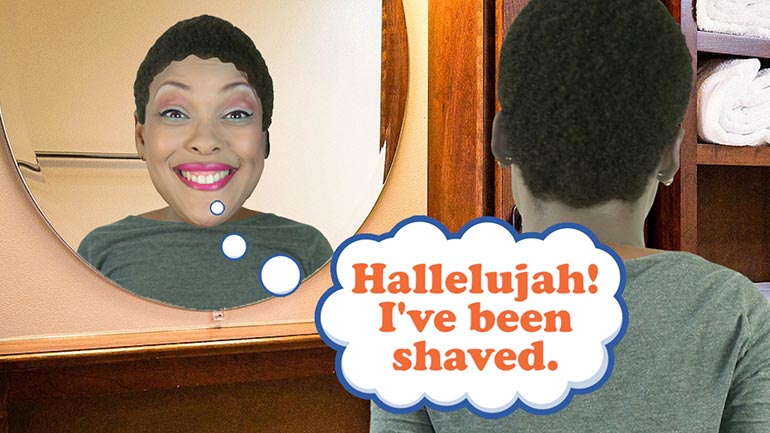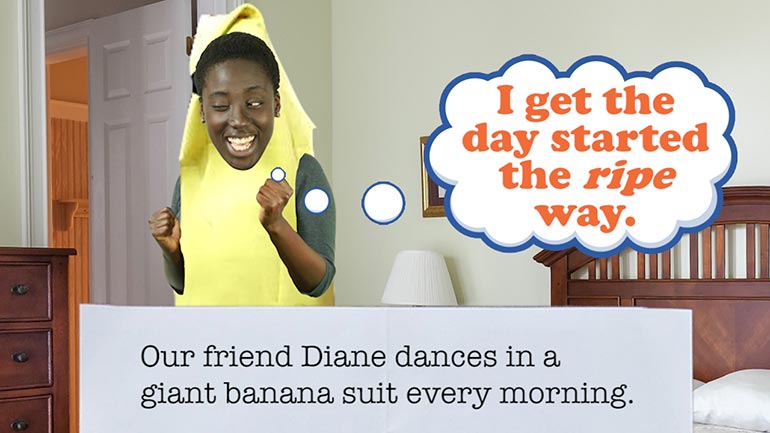ShmoopTube
Where Monty Python meets your 10th grade teacher.
Search Thousands of Shmoop Videos
ELA 4: Formal and Informal Language 161 Views
Share It!
Description:
We like to think of language like clothing. Formal for the right events, and fun and slangy when you're around your friends. Just remember not to literally think of it as clothing. It isn't. You can't cover yourself just by yelling at your body.
Transcript
- 00:02
[Dino and Coop singing]
- 00:12
You've probably noticed that people dress differently in different situations. [Two guys with suits on]
- 00:16
We might wear sweatpants and a torn T-shirt when mowing the lawn… [Guy dressed in mucky outfit mowing his lawn]
- 00:19
…but we probably wouldn't wear the same outfit to meet the Queen of England. [Guy running up to the queen with his dirty clothes on]
- 00:22
Unless…she wanted to mow the lawn with us, or something… [Queen telling the guy he missed a spot]
Full Transcript
- 00:25
Anyway, we see a similar thing when it comes to language: formal language vs. informal language. [Formal language vs informal language in a boxing ring]
- 00:30
Formal language requires us to use proper words, phrases, punctuation, and grammar. [Coop pointing at a blackboard]
- 00:33
It's the language equivalent to a tuxedo, with each and every button buttoned up tight.
- 00:38
Though luckily, you don't need to know how to tie a tie to use formal language. [Bow ties falls off guy with a superman shirt on]
- 00:41
Those things can be pretty darn tricky.
- 00:43
On the other hand, informal language is a lot more relaxed. [Informal language on the beach]
- 00:46
It sometimes uses grammar that isn't super correct, and it uses slang. [Dino pointing at a blackboard]
- 00:51
Totes cray.
- 00:52
It's like the old T-shirt and jeans combo of the language world.
- 00:54
Sure, there might be a few tears, but you can wear them on the bus, no problem. [Informal language on the bus]
- 00:57
Unless it's one of those really fancy buses with a formal dress code, but those are pretty rare. [Smartly dressed people on a bus]
- 01:02
One easy way to tell formal from informal language is by the use of contractions, which [Contractions falls between formal and informal language in the boxing ring]
- 01:06
are words that are made by combining two words.
- 01:08
For example, say you wanted to write: "They are playing in the pool." [Coop pointing at a blackboard]
- 01:11
If you were using formal language, you'd keep it as is, no contraction.
- 01:15
But if you were feeling a bit more informal, you'd change "They are" into "They're."
- 01:20
And whether we use formal or informal language depends a lot on the situation we're entering into. [Woman about to go into a house]
- 01:24
Formal language is mainly used in serious situations, whether that's a job interview…
- 01:29
…a presentation…
- 01:30
…or writing an essay.
- 01:31
We also use formal language when we want to show respect to our listener… [Formal language in the different contexts]
- 01:34
…like if we're talking to a police officer…
- 01:35
…or chatting with the queen.
- 01:37
However, the less serious the situation we find ourselves in… [Guy with superman shirt on speaking to someone in crazy rainbow town]
- 01:40
…the more likely we are to use informal language.
- 01:42
Chances are, if you're hanging with your buds, you'll use contractions and slang.
- 01:46
And hey, if you ever become buddy-buddy with the queen, she might even join in. [The Queen saying, "Nobody is as cray-cray as I am."]
Up Next
Sticks and stones, right? Well...only sometimes. It's a good idea to make sure your words aren't going to hurt others. Let's look at some ways to d...
Related Videos
Learn to debate like a champ. It's way better than debating like a chimp. That just takes mudslinging to a whole new level.
Today we'll learn about biographies and autobiographies. And no, the second one has nothing to do with the lives of cars.
In this lesson we'll subject you to some verbs and predicates. Each one is a necessary part of a complete breakfas—er...sentence.
Choosing words carefully is important. You may end up vexing the assemblage of citizens you're conversing with...or you might even just plain bore...




